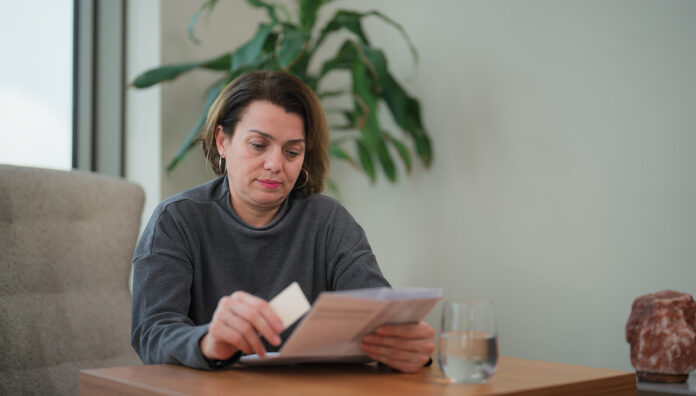At one point in time, Menopausal hormone therapy (MHT) was used fairly extensively.
But this has changed since 2002, when the Women’s Health Initiative (WHI) published a study linking combined MHT (oestrogen and progestin) with an increased risk of blood clots, stroke, breast cancer and heart attacks.
Almost overnight, women stopped using hormone therapy, said CEO of Jean Hailes for Women’s Health, Dr Sarah White.

But there are several factors that led to the study results being skewed.
‘It was [based on] an older group of women who started taking hormone therapy late, and it was a different form of hormone therapy, so those results did not stand up and the increased risk in breast cancer was terribly small,’ she said.
The sensationalist reporting did a huge amount of damage, Dr White said.
‘We still have women today who believe that MHT causes breast cancer, and GPs who are nervous about prescribing it.’
While around one in four women who go through menopause will be asymptomatic or have mild symptoms, a quarter will be at the opposite end of the spectrum and experience severe symptoms, said Dr White.
‘We’re talking about an inability to sleep, terrible brain fog, anxiety, a loss of confidence, and hot flushes that can be catastrophic,’ she said.
The remaining half of women are on a spectrum of experiencing mildly annoying to must-be-managed symptoms.
‘We have women who are trying to soldier on through some really unpleasant physical and mental effects,’ she said. ‘And it’s a bit heartbreaking to think that there’s a medication that can help manage a lot of the symptoms and women are worried about taking it when they have no need to be.’
Is MHT underprescribed?
There’s ‘no doubt’ that MHT is underused in Australia, said Dr White – with barriers to access a compounding factor.
‘It’s not just going to get that doctor’s appointment, it’s the cost of the MHT,’ she said.
Some forms of MHT are subsidised under the Pharmaceutical Benefits Scheme (PBS), such as estradiol patches, but there has been a global shortage of this therapy in 2024.
But newer medicines such as Prometrium – a progesterone-based treatment matching the hormone the body makes when ovulating – are not, setting women back around $60 per month.
Are all women suitable candidates for MHT?
No, cautioned Dr White.
For example, a person who has had a hormone responsive cancer should have a careful discussion with their GP about whether the risks of MHT outweigh the benefits.
‘If you’ve had a hormone responsive cancer, then taking a hormone increases the risk of recurrence,’ she said.
Oral combined MHT will increase the ‘baseline’ risk of thrombosis around two-fold – however the baseline risk remains low in most women. Thrombosis risk increases with increasing age, smoking, increased body weight, in those with genetic predisposition to clotting and in certain illnesses. Risk factors should be considered prior to commencing MHT.
MHT treatment should be individualised based on the patient’s needs, clinical features and risk assessment, and reviewed regularly. Women with a personal or family history of venous thrombosis should undergo screening for risk factors to guide the choice of MHT delivery method. In cases where a woman is deemed to be at high risk for developing deep vein thrombosis (DVT), transdermal MHT should be used.
‘That’s why the message is very clear to speak about your individual circumstances with your doctor,’ added Dr White, who said a consultation to discuss the appropriateness of therapy could include:
- cancer history
- other medical issues
- when the patient went through the menopause transition
- Number of years since the final menstrual period.
‘There’s a range of factors the doctor will ask about to understand the appropriateness, the dose and the form of delivery,’ Dr White added.
Does MHT protect against cardiovascular risk?
Further assessment of the WHI revealed that there was no evidence of harm from cardiovascular disease (CVD) for women who started using MHT close to the menopause.
In fact, a trend of reduced CVD risk was identified in this cohort.
There is also evidence of reduced mortality or protection from coronary heart disease among those who are initiated on MHT within 10 years post menopause.
It has been advocated by some that MHT can provide protection against cardiovascular disease.
But the International Menopause Society Guidelines note the benefits and risks vary by dose and formulation of MHT and timing of initiation, said Dr White. Again, this requires an individualised assessment.
What about the risk of dementia?
In another blow for MHT, a 2023 Danish observational study of 60,000 women found that those using oestrogen-progestin MHT had 24% increased risk of developing dementia, including Alzheimer’s disease, than those who did not undergo treatment with MHT.
But experts have their doubts – including Obstetrician and gynaecologist Associate Professor Gino Pecoraro, from the University of Queensland, who said that while 90% of women in the study took combined oral oestrogen and progestin, this dosage form differs to what is commonly used in Australia.
‘Australian women are more likely to use native progesterone and the transdermal route for administration,’ he said.
There was a slight increase in risk of dementia in women who started MHT at a younger age. However, this age cohort also has other health concerns to take into account.
‘Women who go through an early menopause, may be prescribed MHT up until the average age of menopause to protect bone health,’ added Dr White.
Is long-term prescribing of MHT advised?
Some prescribers will say that similar to other medicines, patients should remain on MHT until symptoms resolve, said Dr White.
‘Then there are [others] who aren’t worried about keeping people on MHT for extensive periods of time, decades even,’ she said.
This is particularly important for women at high risk of osteoporotic fracture.
But discrepancies about use, among other aspects, reflect the long-standing lack of investment in clinical trials into women’s health, Dr White emphasised.
‘If you [consider that] 50% of the population will go through the menopausal transition, we don’t have clinical trials that have assessed how safe it is to stay on the most effective medication we have for managing symptoms for a long time,’ she said.
What’s the role of pharmacists?
As trusted healthcare professionals, pharmacists are on the front line encountering many women who are going through menopause.
‘We know women will see their pharmacists far more frequently than their GP, so it’s [important] to have these conversations with women to ask why they haven’t been to see their doctor about MHT,’ said Dr White.
‘If they [encounter] someone worried about [adverse] effects, they can reassure women by saying, “It can be really effective. There’s a lot of unfounded concerns, and I would encourage you to go and talk to your doctor about it”.’
Pharmacists can also help to allay fears by explaining that a doctor will assess if MHT is appropriate.
‘Pharmacist can say, “Your doctor will go through your individual risks and work out if it’s right for you. But most women can take MHT without any concerns about their health”.’
Pharmacists can also provide lifestyle advice and/or suggest other medicines for women going through menopause
‘For example, struggling with sleep is a very common complaint when women are going through menopause,’ said Dr White.
Prescribing Schedule 3 melatonin, for adults aged 55 or over, could help.
Other strategies Dr White suggests include:
- reducing alcohol levels
- stopping smoking
- upping nutrition intake
- increasing exercise.
These lifestyle modifications are complementary to treatment with MHT.
’We often talk about a midlife collision, [which] is a time when many women are dealing with children, elderly parents, work and domestic responsibilities,’ she said. ‘And menopause can be the thing that really tips women over the edge.’
With so much going on, it’s crucial to have a healthy lifestyle.
‘If you’re not earning as much as your male colleagues, you don’t have superannuation at the same level, and you’ve got all these financial obligations – a patch on your backside is not going to help with that,’ said Dr White. ‘Stress management, a great diet, exercise and sleep will help with more than just menopause symptoms.’



 Professor Margie Danchin[/caption]
Professor Margie Danchin[/caption]

 Dr Peter Tenni[/caption]
Dr Peter Tenni[/caption]
 How should we deprescribe gabapentinoids, according to the Maudsley Deprescribing Guidelines[/caption]
How should we deprescribe gabapentinoids, according to the Maudsley Deprescribing Guidelines[/caption]



 Pharmacists have always prescribed, but they have the potential to prescribe much more
Pharmacists have always prescribed, but they have the potential to prescribe much more






